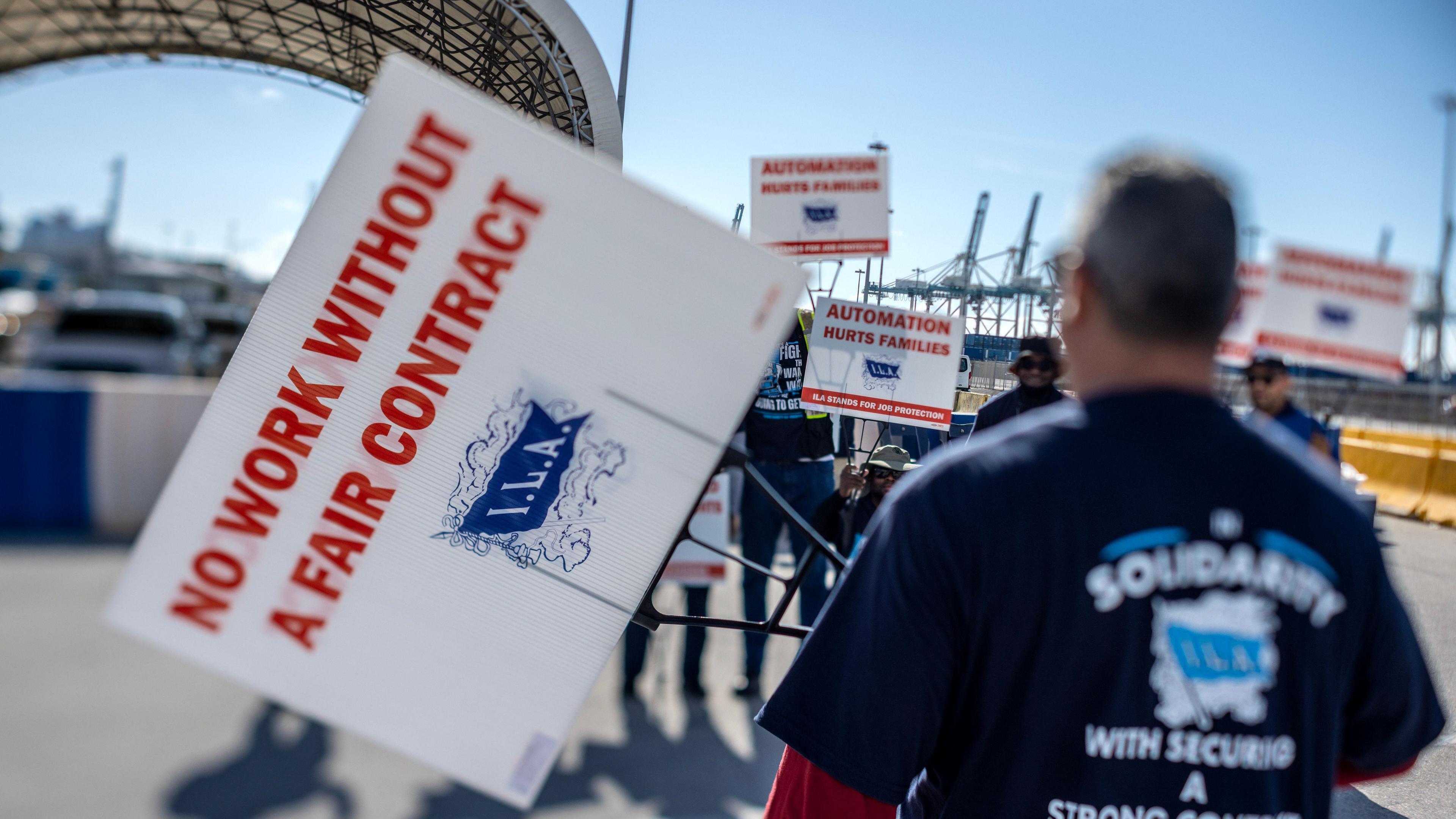'I'm not playing games' on port strikes, union boss says

- Published
Major US ports will stay shut until pay demands are met, the union boss representing striking dockworkers has said.
Harold Daggett, head of the International Longshoremen's Association (ILA), made the vow on a picket line in New Jersey on Tuesday, as tens of thousands of dockworkers on the east and gulf coasts walked out in a bid to win a better labour deal.
"We're going to fight for it and we're going to win or this port will never open up again," he said. "I'm not playing games here."
Businesses are bracing for the possibility of a prolonged ports shut down, which threatens to cause havoc to global trade and the US economy.
President Joe Biden has so far rebuffed calls by some of country's biggest business groups to use federal power to reopen the ports for 80 days, suspending the strike to provide a cooling-off period for further negotiation.
"It’s only fair that workers, who put themselves at risk during the pandemic to keep ports open, see a meaningful increase in their wages as well," Biden said.
"Now is not the time for ocean carriers to refuse to negotiate a fair wage for these essential workers while raking in record profits."
Republican presidential candidate Donald Trump also backed the striking port workers.
"American workers should be able to negotiate for better wages, especially since the shipping companies are mostly foreign flag vessels", he said in a statement.
The strike, the first since 1977 for the ILA, has brought to a halt container traffic across 14 of the country's busiest ports, including in New York, Georgia and Texas.
The ports are estimated by experts to handle more than a third of the US's imports and exports. Disruption could lead to delays on goods deliveries for businesses and consumers.
The president said officials would be on the alert for signs of prices being unfairly hiked in the event of potential shortages.

US ports strike causes first shutdown in 50 years
- Published1 October 2024
Talks on a new deal were stalled for months ahead of the strike, but the United States Maritime Alliance (USMX), which represents shipping firms and port associations, said that the two sides had started to trade proposals again.
Under the 2018 contract that expired on Monday, dockworkers earned a base hourly wage of $20-$39, as well as other benefits, including royalties tied to container traffic.
USMX said its most recent offer would boost pay by nearly 50%, triple company contributions to retirement and improve healthcare, among other concessions.
The organisation said the offer exceeded "every other recent union settlement" and called the current stand-off "completely unavoidable".
"We look forward to hearing from the union about how we can return to the table and actually bargain, which is the only way to reach a resolution,” it said.
However, the ILA's Mr Daggett said that there had been "nothing" so far to bring the union and companies together to end the strike.
He said he was prepared to keep the ports shut until companies agreed to boost hourly pay by $5 for each year of the contract. The union, which has about 47,000 active members according to federal filings, is also seeking protections against automation.
"I'm going to fight for it because those greedy companies are making billions of dollars and they don't want to share," he said. "I want my members taken care of for the rest of their lives and that's why we're out here."
If prolonged, the stoppage is expected to lead to higher prices and shortages in the US, with shipping delays and other impacts rippling out across the world.
"We are seeing now that ships are starting to anchor outside of the ports waiting to see what is going to happen," said Anne-Sophie Fribourg, a vice president at freight forwarding firm Zencargo, which organises shipments for exporters and importers.
"The disruption is going to be massive if the strike lasts," she said.
Hamid Moghadam, chief executive of Prologis, one of the biggest warehouse companies in the world and landlord to the likes of Amazon, said while the strike was not a shock, it was "nonetheless" going to hurt the economy.
"It's going to interfere with the proper functioning of the flow of goods," he told the BBC.
Already 100,000 containers are in limbo waiting to be unloaded in the New York area, and another 35 ships are expected to arrive this week, the Port Authority of New York and New Jersey said.
Danny Reynolds, the owner of Stephenson's, a 93-year-old clothing store in Elkhart, Indiana, said he had paid extra to expedite shipments of sweaters and coats into the country ahead of the strike.
But about 25% of his inventory has yet to arrive and he has his fingers crossed it has been unloaded. He said he was most worried about potential delays for special-order bridal gowns for November and December weddings.

"Where we get concerned is where we have special order merchandise for people's wedding days that could be locked up on a ship unable to get to us. That's a hard thing to explain to a potential bride," he said.
About 75% of his merchandise is routed through east coast ports, he added. He explained while he expected his business to be able to function through the end of the year, he feared the wider impact.
"I think the results to the economy could be devastating if this goes on," he suggested, adding that he wanted to see the president step in.
"I think it's beyond time, quite honestly, for the Biden administration to sit down at the table with them and see what can't be done to open this things back up."